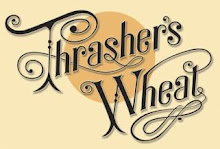"Thanks for being one of the few people to tell the truth!": Jimmy McDonough

Thrasher & Thrashette had a good ol' fashioned movie date this weekend. Finally got around to seeing that new Neil Young movie everyone's been raving about.
Yes, it's what everyone has been saying about the film -- and more.
I found Shakey author Jimmy McDonough's recent put-down of Prairie Wind to be rather innaresting. McDonough's response to the San Jose Mercury News negative review by Brad Kava was "Thanks for being one of the few people to tell the truth!". Hmmm.
In the San Jose Mercury News review, critic Brad Kava calls the new songs "uncomfortably verbose and prosaic" and "faded versions of older songs."
So what are McDonough and Kava getting at here about the film's core material? How can critic Jim DeRogatis in the Chicgo Sun-Times call the film an "instant classic, one of the most musically sensitive and emotionally gripping movies of its kind" and have respected critics like McDonough sneer?
Who can say whether a song like "When God Made Me" in 5 or 50 years from now will be recognized for distilling the world's religions into ten succint questions? It would seem to be very difficult for any self respecting critic to call such a song "uncomfortably verbose and prosaic".
As we pondered that question while exiting, I was struck remembering the angry backlash reaction to Greendale where audiences looking for the old classic songs were confronted with new, unfamiliar songs that seemed marginal on first listen. Or back in 1973 on the brutally confrontational Time Fades Away tour where audiences expecting the sunny optimism of Harvest got new, unheard songs with raw emotional lyrics like "Yonder Stands The Sinner" and high amplification electric guitar instead.
So what we saw and heard was a film that truly respects the craft of making music. The loving close-ups of Hank Williams' Martin guitar are practically worth the price of admission alone.

The slow dissolves perfectly choreographed to the music would indicate multiple takes and extensive rehearsals yet - as we all know - were pretty much single take efforts at a live concert performance.
But for me, the best part of "Heart of Gold" were the small parts that you probably didn't even notice in the live concert yet are captured beautifully by cinematographer Ellen Kuras with understated fluidity. The knowing looks, glances and nods between the musicians onstage. The close-ups of Ben Keith's fingers on pedal steel. The reverence for the Grand Ol' Opry auditorium and those musicians who came before them.
And not only does film director Jonathan Demme capture the respect of musicians for their craft and fellow musicians, but also respect for the craft of filmmaking itself. Not resorting to any film tricks, special effects, cheering audience shots, fancy camera work or other intrusive techniques, the film's effect is as classic and timeless as the man and his music.
More on the movie "Neil Young: Heart of Gold".
UPDATE - March 15, 2006: Reaction to this post below in comments and at "Gang of 400" - Thrasher's Wheat's Cabal?.
Technorati tag: Neil Young




































 Concert Review of the Moment
Concert Review of the Moment







![[EFC Blue Ribbon - Free Speech Online]](http://www.thrasherswheat.org/gifs/free-speech.gif)











 Submit Your Neil Links Now!
Submit Your Neil Links Now!























 Four Dead in Ohio
Four Dead in Ohio














